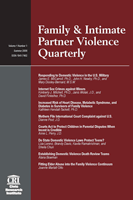Responding to Rural Vicarious Trauma
Author: Kris Bein.
Source: Volume 08, Number 04, Spring 2016 , pp.339-344(6)

< previous article |next article > |return to table of contents
Abstract:
Regardless of the setting—shelter, outreach, or outpatient center—advocates who are steeped in helping victims of sexual or domestic violence face the risk of getting burned out or even vicariously traumatized. Listening to horrifying testimonies from victim after victim is not for the faint of heart. There are, however, special challenges faced by advocates who work with victims or perpetrators in rural settings. As author Kris Bein explains in this piece, there are multiple reasons for this: smaller population areas mean fewer agency staff, less funding, fewer law enforcement personnel, and more opportunities for problematic multiple relationships between DV advocates, victims, and perpetrators. Fortunately, Ms. Bein provides a list of recommendations specifically tailored to address and ameliorate the difficulties inherent to practicing domestic violence advocacy in small community settings.Keywords: Alleviating and preventing vicarious trauma
Affiliations:
1: National Sexual Assault Coalition Resource Sharing Project.